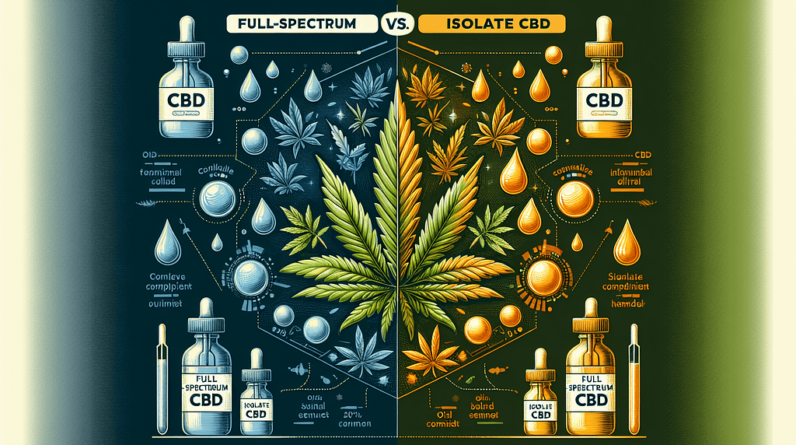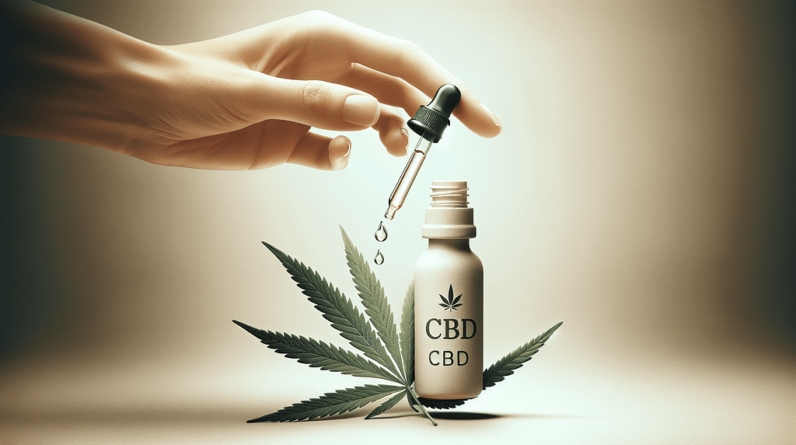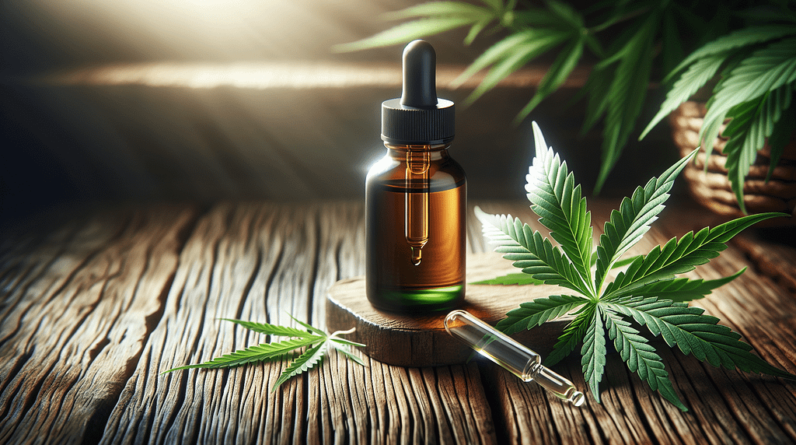As an Amazon Associate I earn from qualifying purchases.
Discover CBD’s potential to alleviate anxiety in our comprehensive guide. Learn about types, benefits, and how to use CBD effectively for natural anxiety relief.
The Essential Guide to Using CBD for Anxiety Relief
Anxiety can be a debilitating condition, affecting millions of people worldwide. Traditional treatments, such as pharmaceutical drugs and therapy, can be effective but often come with side effects or are not accessible to everyone. Enter CBD, a natural remedy that has been gaining popularity for its potential to alleviate anxiety without the harsh drawbacks of traditional medications. In this guide, you’ll explore the ins and outs of using CBD for anxiety relief, providing you with the knowledge to make an informed decision about this alternative treatment.
What is CBD?
CBD, short for cannabidiol, is one of the many compounds found in cannabis plants. Unlike its more famous cousin, THC (tetrahydrocannabinol), CBD does not produce the “high” associated with marijuana use. This makes it an appealing option for those seeking relief from various conditions without the psychoactive effects.
How CBD Interacts with the Body
The human body has an endocannabinoid system (ECS) that plays a crucial role in regulating mood, sleep, and stress responses. CBD interacts with the ECS by influencing its receptors, such as CB1 and CB2, helping to restore balance and potentially alleviating symptoms of anxiety.
Types of CBD Products
When it comes to using CBD for anxiety, there is a plethora of products to choose from. The most common types include:
CBD Oil: Can be taken sublingually or mixed with food and beverages.CBD Capsules: Offer a pre-measured dose, making it easy to track your intake.CBD Edibles: Gummies and other foods infused with CBD, offering a tasty and discreet option.CBD Vapes: Provide quick relief as CBD is absorbed through the lungs.Topicals: Creams and balms applied directly to the skin, ideal for localized issues but less effective for anxiety.
Benefits of Using CBD for Anxiety
Numerous studies have indicated that CBD can be effective in reducing anxiety. Here’s a closer look at some benefits:
Reduction in General Anxiety
CBD has shown promise in reducing general anxiety by influencing the serotonin receptors in your brain. These receptors play a key role in mood regulation, and CBD’s interaction with them may help to ease feelings of worry and agitation.
Alleviation of Social Anxiety
Social anxiety can make it incredibly challenging to participate in daily activities that involve interacting with others. Research suggests that CBD can help reduce the fear of social situations, making it easier for you to engage in conversations and activities.
Better Sleep
Anxiety often goes hand-in-hand with insomnia or disrupted sleep patterns. CBD has been found to improve sleep quality by calming the mind and body, making it easier for you to fall asleep and stay asleep.
Non-Addictive and Minimal Side Effects
One of the major advantages of CBD is that it is non-addictive and has minimal side effects. Unlike traditional medications, which can be habit-forming and come with a slew of side effects, CBD is generally considered safe for long-term use.
https://medium.com/media/54533f15b3d06bca9a0f98ad3ff187fa/href
How to Choose the Right CBD Product for Anxiety
When starting your CBD journey, it’s important to choose the right product to ensure you get the most benefit. Here’s what to look for:
Quality and Purity
Always opt for high-quality CBD products that are lab-tested for purity and potency. Check for third-party lab reports to verify the product’s ingredients and ensure it is free from contaminants like heavy metals and pesticides.
Full-Spectrum vs. Isolate
Full-spectrum CBD products contain a range of cannabinoids and terpenes, which can work together to enhance the therapeutic effects — a phenomenon known as the “entourage effect.” CBD isolate, on the other hand, contains only CBD and no other cannabinoids. Both types have their pros and cons, and your choice will depend on your personal preferences and the specific symptoms you’re aiming to treat.
Dosage
Finding the right dosage can be a bit of trial and error. It’s usually best to start with a low dose and gradually increase until you find what works for you. Consulting with a healthcare provider experienced in CBD use can also provide guidance tailored to your needs.
How to Use CBD for Anxiety Relief
Now that you have a good understanding of what CBD is and its benefits, let’s delve into how to use it effectively for anxiety relief.
Starting with a Low Dosage
As mentioned earlier, it’s important to start with a low dosage and gradually increase it. This approach allows you to gauge how your body reacts to CBD and find the optimal dosage for your needs.
Methods of Consumption
How you consume CBD can also impact its effectiveness. Here are some methods to consider:
Sublingual: Taking CBD oil under the tongue allows for quick absorption into the bloodstream.Oral: Edibles and capsules are convenient but take longer to take effect as they must be digested first.Inhalation: Vaping CBD can provide rapid relief, making it a good option for acute anxiety attacks.Topical: While not as effective for anxiety, topicals can be useful for localized pain relief.
Timing Your Dosage
The timing of your CBD dosage can also make a difference. For example, if you struggle with social anxiety, you may want to take your CBD dose about an hour before you know you’ll be interacting with others. Similarly, if sleep is a concern, taking CBD an hour before bedtime can help promote relaxation and better sleep quality.
Keeping a Journal
Maintaining a journal to track your CBD usage, dosage, and the effects you experience can be incredibly helpful. This will allow you to notice patterns and make adjustments as needed to optimize your anxiety relief.
CBD and Traditional Anxiety Treatments
While CBD holds promise as an anxiety treatment, it’s important to consider how it interacts with traditional treatments such as medications and therapy.
Interaction with Medications
CBD can interact with certain medications, including those commonly prescribed for anxiety. Always consult your healthcare provider before adding CBD to your regimen to avoid any adverse interactions.
Complementing Therapy
CBD can be a valuable addition to traditional therapy approaches like cognitive-behavioral therapy (CBT). It may help reduce anxiety symptoms, making it easier for you to engage fully in your therapy sessions.
Potential Side Effects of Using CBD
While generally considered safe, CBD can have some side effects, although they are usually mild:
Dry Mouth: CBD can reduce saliva production, leading to a dry mouth.Dizziness: Some people may experience light-headedness or dizziness, especially when using higher doses.Diarrhea: High doses of CBD may cause digestive issues in some individuals.
Always start with a low dose and pay attention to how your body reacts. If you experience any severe side effects, discontinue use and consult a healthcare provider.
The Legal Landscape of CBD
The legal status of CBD can vary widely depending on where you live. In the United States, CBD derived from hemp (containing less than 0.3% THC) is legal at the federal level but can still be subject to state-specific regulations. Always check local laws to ensure you’re in compliance.
Real-Life Success Stories
Hearing from others who have successfully used CBD for anxiety relief can be inspiring and reassuring. Many individuals have shared their experiences of how CBD has helped them navigate social anxiety, generalized anxiety disorder, and even panic attacks. These testimonials can provide hope and encouragement as you explore this treatment option.
Common Misconceptions About CBD
Several misconceptions surround CBD, which can contribute to confusion and skepticism:
CBD will get you high: Unlike THC, CBD does not produce psychoactive effects.CBD is addictive: Studies suggest that CBD is not habit-forming and may even help with addiction issues.CBD is a cure-all: While promising, CBD is not a miracle cure and should be used as part of a comprehensive treatment plan.
How to Enhance the Effects of CBD
Certain lifestyle changes and complementary treatments can enhance the effects of CBD on anxiety:
Maintaining a Healthy Diet
A balanced diet can support your overall well-being and make CBD more effective. Foods rich in omega-3 fatty acids, like fish and flaxseeds, can support your endocannabinoid system.
Regular Exercise
Physical activity can help reduce anxiety by releasing endorphins and improving your mood. Combining regular exercise with CBD may offer synergistic benefits.
Mindfulness and Meditation
Practicing mindfulness and meditation can complement the anxiety-relieving effects of CBD. Techniques such as deep breathing and guided meditation can help calm your mind and reduce stress.
Better Sleep Hygiene
Improving your sleep hygiene can enhance the benefits of CBD for anxiety. Establish a regular sleep schedule, create a comfortable sleeping environment, and avoid screens before bedtime to promote better sleep.
Future Research and CBD
The field of CBD research is still in its infancy, but ongoing studies continue to explore its potential benefits and mechanisms of action. With more research, we may gain a deeper understanding of how CBD can be used most effectively for anxiety and other conditions.
Final Thoughts
Using CBD for anxiety relief can be a game-changer, offering a natural alternative to traditional treatments. From selecting high-quality products to finding the right dosage and method of consumption, this guide aims to equip you with the knowledge you need to make informed decisions. Always consult a healthcare provider when starting any new treatment, and remember that managing anxiety often requires a multifaceted approach.
If you found this guide helpful, please clap for the article, leave a comment, and subscribe to our Medium newsletter for more updates and information!
Disclosure: This story incorporates AI assistance for content creation.
Amazon and the Amazon logo are trademarks of Amazon.com, Inc, or its affiliates.






